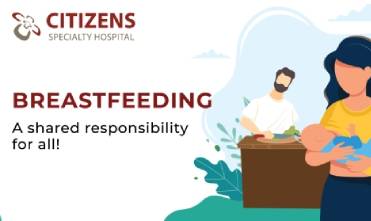
Breastfeeding – A shared responsibility for all
Breastmilk is regarded as the perfect food for infants. World Health Organization (WHO) states breastfeeding is one of the most effective ways to ensure good health and survival for the baby.
WHO estimated that over the last two decades, every 2 out of 3 infants have not received exclusive breastfeeding not even to a minimum recommended 6-month duration in their lives.
Let us all unitedly help protect breastfeeding, by supporting and spreading awareness about it!
Benefits of breastfeeding:
For Infant –
- Ideal safe nutrition
- Antibodies provide immunity
- Protects against various infections
- Ensures adequate growth & development
- Easier to digest
For Mother –
- Less risk of depression, hypertension, breast and ovarian cancer.
- Helps in uterine contraction after delivery.
- Aids in weight loss
- Prevents menstruation
Barriers or hurdles on way of breastfeeding:
The benefits of breastfeeding are well known and proven, still, there are some barriers on the way of exclusive breastfeeding making it difficult for women.
There could be many barriers to exclusive and satisfactory breastfeeding including:
- Early marriage and young maternal age (<20 years) – Early marriage/child marriage is still practiced in some rural areas, and at young maternal age, the mother herself is too young to understand motherhood, breastfeeding and its benefits as well as importance.
- Lack of knowledge on benefits of breastfeeding – Most of the women are unaware about when, and whereabouts of breastfeeding. It is something which a woman learns gradually only after giving birth to the baby. Although women might be aware of its worth to breastfeed a baby but they need to be educated about its role in normal growth & development of the baby.
- Late initiation of breastfeeding & not giving colostrum (a common myth)
- Poor counselling/guidance of mothers after delivery
- Breastfeeding is not the social norm in many communities
- Feeling embarrassed to feed in public places
- Inadvertent promotion of formula milk and misconception that formula is equivalent
- Lactation issues due to various health reasons
- Poor support from family, no comfortable place to feed
- Busy and working mothers unable to give proper time to baby
Shared responsibility – Whose responsibility is to protect breastfeeding?
It’s everyone’s joint responsibility to encourage and protect breastfeeding. It starts from the mother herself, then the family members, friends, relatives, and others equally.
- Mother’s role herself – Every woman should be well educated and aware about breastfeeding, its importance, and its role in her baby’s growth. The mother should be determined and self-motivated enough to breastfeed and provide her baby with the universally best nutrition which she can.
- Family & social support – Not only the mother but baby’s father, other close family members, close friends, and relatives should encourage and make the mother feel comfortable enough to breastfeed whenever and wherever the baby needs it irrespective of being at home or any public place. She should be always explained about the dual benefits of breastfeeding over other alternatives. Lack of family and social support always affects the determination, decision, and attitude of a mother to breastfeed.
- Role of physicians and decision-makers – Soon after the delivery, the mother needs correct guidance and assistance on breastfeeding. The gynecologists, pediatricians as well as other healthcare staff play a crucial role in educating, explaining and guiding the woman across her journey of pregnancy and post-partum, about the dual benefits and importance of breastfeeding. Until and unless there are any health issues or other conditions due to which a mother is unable to breastfeed her baby, alternative ways (top-feed, etc.) should not be preferred over breastmilk.
- Others who can be a part – social media, which is an inseparable part of our lives nowadays, can be an efficient medium to spread a positive message on breastfeeding through multiple ways. Most of the working women are unable to provide their little ones, the better care and nutrition they need just because of long working hours or related reasons. The employers can support working mothers by being a bit flexible on their working hours/shifts, and workload whenever she needs it.
